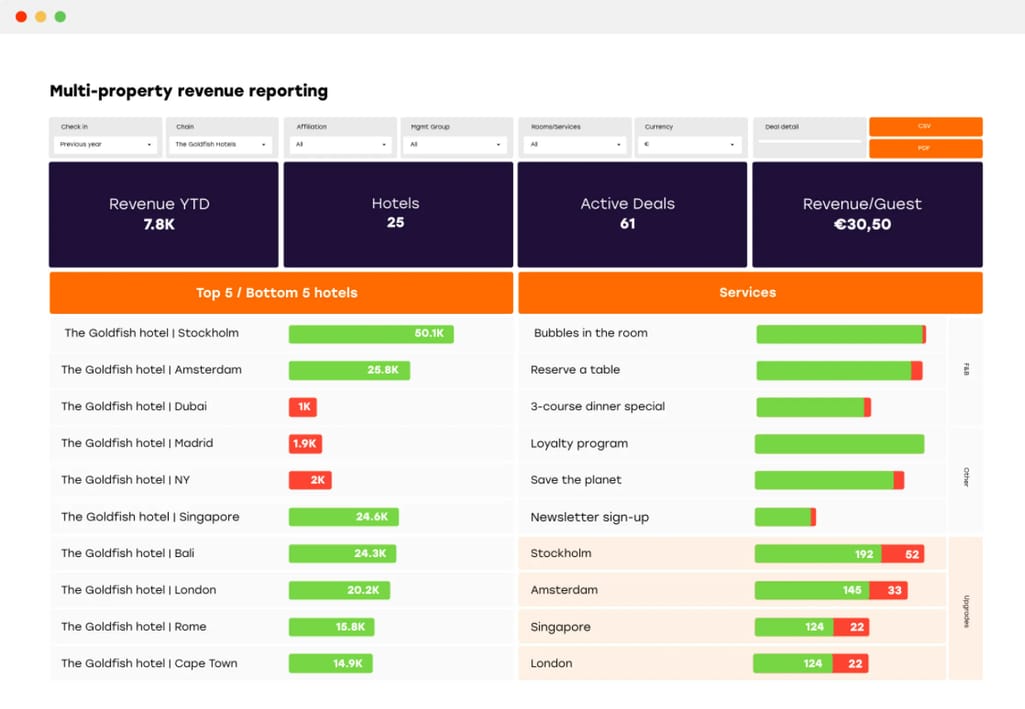Upselling and cross-selling provide hotel owners and managers with the ability to drive greater profit from the same guest by the timely offering of valuable services. In addition to more incremental revenue, these techniques can help pave the way to a better guest experience and therefore higher customer loyalty.
This post will explain the key hotel upselling and cross-selling strategies, ways to digitize them effectively, and examples of existing software serving that purpose.
What is hotel upselling and cross-selling?
From typical hotels and vacation rentals to luxury resorts and boutique inns, whatever property you manage, there are two important techniques you can go with to maximize your gains from it — upselling and cross-selling. While there’s a difference between the two terms, they often go side by side. Here are some examples.
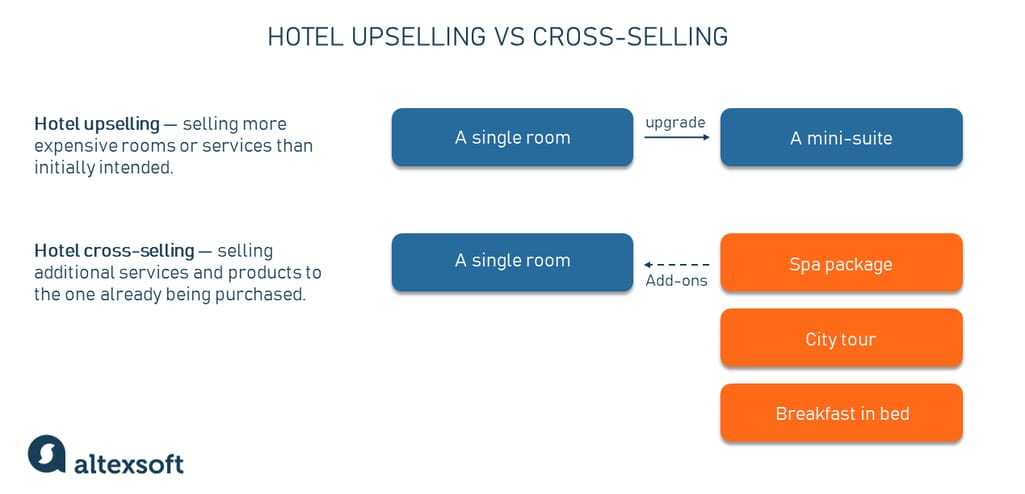
The differences between hotel upselling and hotel cross-selling
Upselling is a method of offering an upgraded, more expensive type of service or product that a customer is interested in purchasing.
In hospitality, upsells may include things like
- room upgrades — proposing guests upgrade their choice of room during or even after booking, say, from a standard room to a mini-suite — and
- packages — proposing guests available hotel packages for different amenities and explaining the added value they provide as compared to standalone bookings.
The idea isn’t only to move your customers to a higher price category but also to ensure they get the best possible stay experience.
Cross-selling is a method of encouraging your guests to buy an additional yet related product or service to the one they are already buying. For example, offering a spa package or a romantic dinner.
Cross-sells may be as follows:
- add-on activities such as organized city tours or bicycle rentals that can be either provided by your property or by third parties through partnerships;
- in-room extras such as upgraded bath amenities, baby high-chairs, pet beds, etc.;
- on-site spa and fitness services that go far beyond the basics of a room and take the trouble of booking them off the guests’ shoulders;
- on-site food and beverage options such as happy hour menus, dining discounts and packages, vending machines on floors, and serving meals in rooms; and
- other hotel services such as complimentary parking, transportation, babysitting, free breakfasts for kids, and transportation options, to name a few.
Both upselling and cross-selling techniques are a part of hotel revenue management. They work when they target the right group of guests (e.g., business or leisure (or bleisure) travelers, families or couples) at the right time. Traditionally, it would be the job of the front-desk staff to suggest an improved room type or additional services. Today, there are various tech solutions to digitize and automate these processes.
Why is online upselling and cross-selling important for hoteliers in the first place?
Even setting the COVID-19 pandemic aside, those owning and managing hotels and vacation rentals face many difficulties with reaching profitability including strong competition, an increasing reliance on online travel agencies (OTAs), and continuously growing expectations from guests. While OTAs offer a variety of distribution options for hotels, their commission can reach up to 30 percent, decreasing the revenue. Not to mention that they rarely cover such touchpoints as room upgrades and complementary services. Digital solutions for upselling and cross-selling come to the rescue as they can
- personalize the individual guest experience,
- boost the average spend per guest, and
- increase customer lifetime value, etc.
So, what exactly can you do to move in the direction of more effective hotel upselling and cross-selling?
Online upselling and cross-selling strategies
The implementation of direct bookings and upselling and cross-selling functionality should be a top priority for property owners and managers. There are several tactics to make that happen.
Identify target audiences for upselling and cross-selling
Before you start developing any strategies, define the categories of customers that are fitting targets for upselling and cross-selling. The worst thing you can do is be pushy with guests who aren’t interested in any additional services or products. To determine targets worth your effort, you can opt for propensity modeling — building predictive models to forecast the behavior of your target audience based on their past behaviors. For this, you may use the data from your property management system (PMS), customer relationship management (CRM) system, and central reservation system (CSR). Customer types who purchased additional products in the past are more likely to do that again.
Personalize your website experience
Personalization goes a long way when it comes to online upselling and cross-selling. People like being treated as individuals and personalized messages will ensure they feel valued. You want to communicate your offers to the right audience at the right time in the right manner. For this, you can opt for the next best action marketing strategy and use machine learning to implement it.
Read about the winning hotel marketing campaigns in our overview.
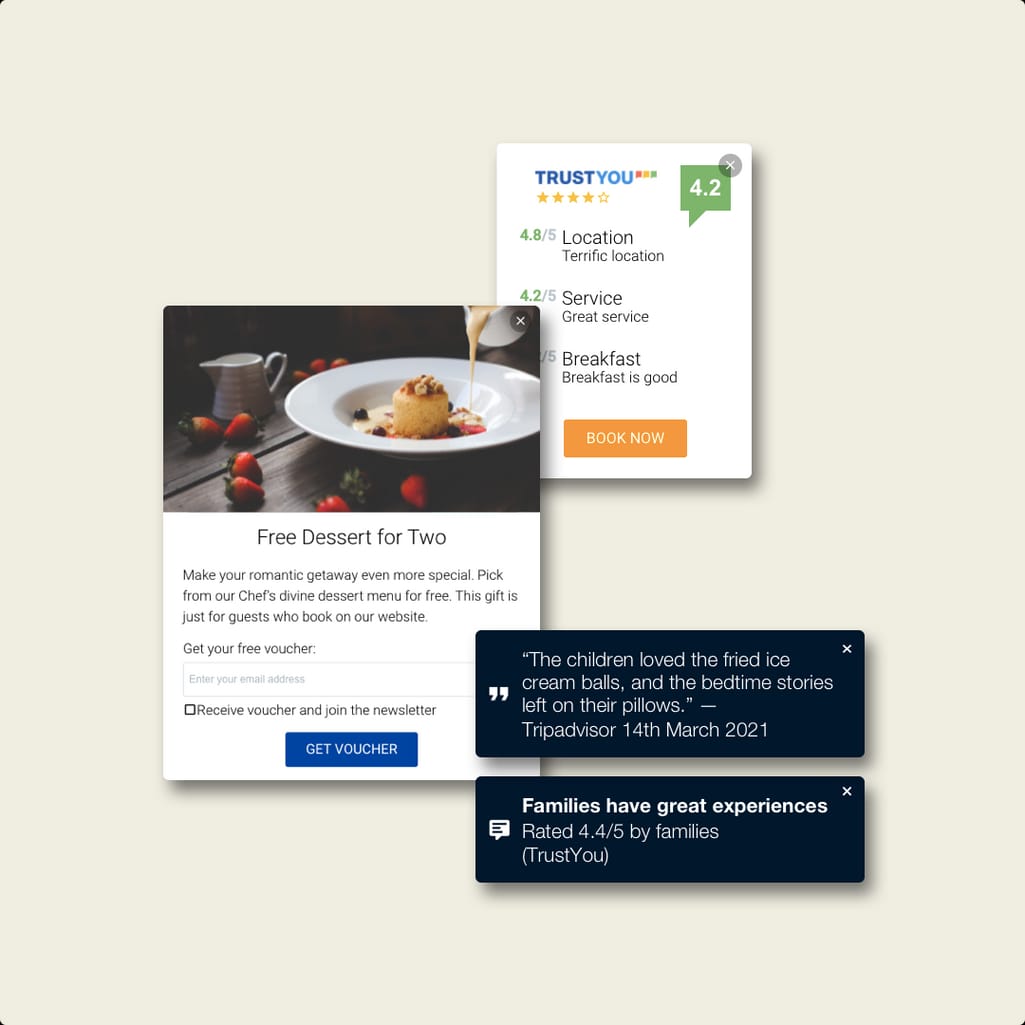
An example of a cross-sell message for hotels. Source: Hotelchamp
Say, you have a branded website and there’s a user who has just made a reservation. The reservation includes a two-night stay in a double-bed room. The customers are more likely a couple and may be interested in a romantic dinner. On the booking confirmation page, you can show a relevant cross-sell service message encouraging guests to reserve a table in your hotel restaurant and get a complimentary dessert or bottle of wine.
You should include relevant upselling offers and messages throughout your website, ideally next to the products that are oriented on upgrades. There's a decent chance your customers will come across something that catches their attention and purchase it.
Partner with local activity providers to extend your cross-sells
Since add-on activities are a likely cross-selling element, you can increase your hotel reach by partnering with local businesses that provide those activities. They can be walking food tours, boat trips on a local river, day spa packages, and other offerings that express the charm of your city. Such partnerships will drive your profit up. The guests, in turn, will be more satisfied as they won’t have to book entertainment on multiple platforms. Since various businesses use different software tools, make sure your system integrates well with target partners. The common way is to configure communication through application programming interfaces or APIs.
Provide offers at different touchpoints of a guest's journey
In terms of hotel upselling and cross-selling, timing plays an important if not the most crucial role. Not only should you know whom to target but also the best time to reach out to guests with personalized offers.
During booking and checkout. The perfect time to upsell your room upgrades is during the booking process. You can include room photo slideshows to visually represent the advantages of more desirable rooms on the room search result page in your online booking engine. Also, you should display standard rates and package rates alongside each other to show the added value and let your customers choose what fits their needs best.
At the same time, do be careful with cross-sells at this stage as being pushy can dampen the interest of potential guests.
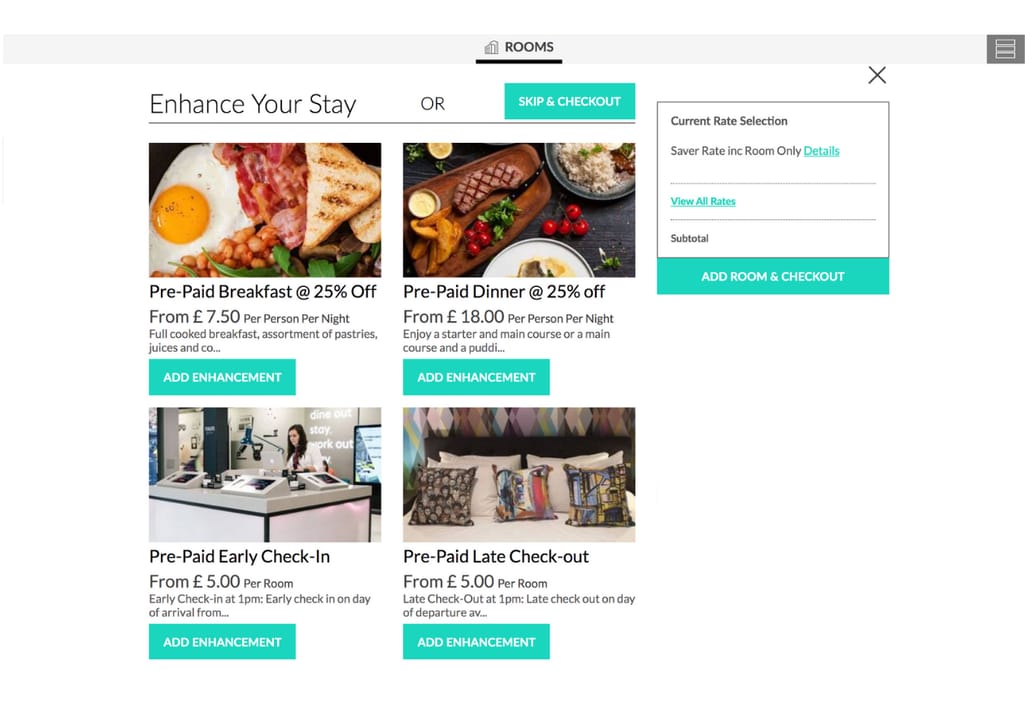
Upsells during the checkout process. Source: Duve
You can leave simple options that don’t require a customer to accept or decline them in order to accomplish the booking. Offering some enhancements at checkout isn’t irritating and can boost your profit from the same guest.
Pre-arrival. A good time for both upselling and cross-selling is after the booking is made but before the arrival. During this period, guests are experiencing excitement about their future trips and are more willing to pay for their stay enhancements. Emails and messages work well to acknowledge your guests with relevant offers before they arrive. With software providing pre-arrival email templates, these processes can be easily automated and personalized.
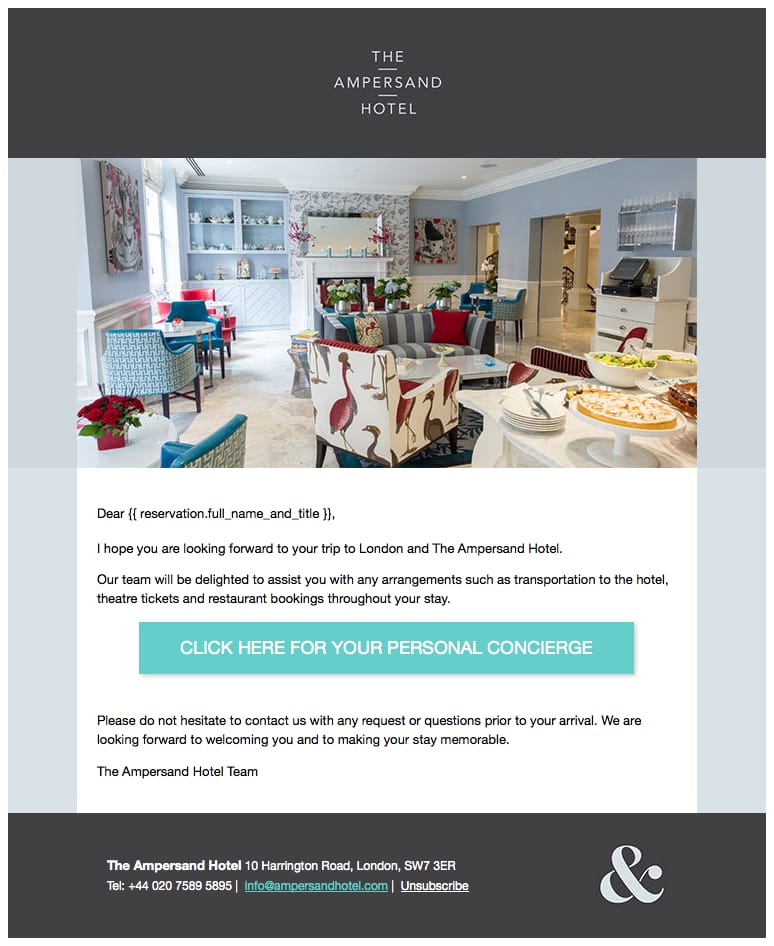
The pre-arrival offer template. Source: Pinterest
Transportation services from an airport to your hotel is a good cross-sell example at this stage.
At check-in. At check-in, use a more traditional upselling and cross-selling approach by having your front-desk staff make suggestions. At the same time, there are self-check-in apps and virtual hotel concierge technologies that can be used for promoting additional services and products at your hotel.
During the guest's stay. Once checked in and settled, your guests can be cross-sold via mobile messaging, emails, your hotel app, or in-person. Yet, this shouldn't be a tsunami of annoying offers that are irrelevant to a guest during their stay.
Hotel property management modules for upselling and cross-selling
Hotels and other hospitality properties are complex systems that incorporate various internal and external operations and tasks of multiple departments. Property management systems (PMSs) bring these operations into one cohesive mechanism. We’ll show you the basic structure of a hotel PMS for a better understanding.
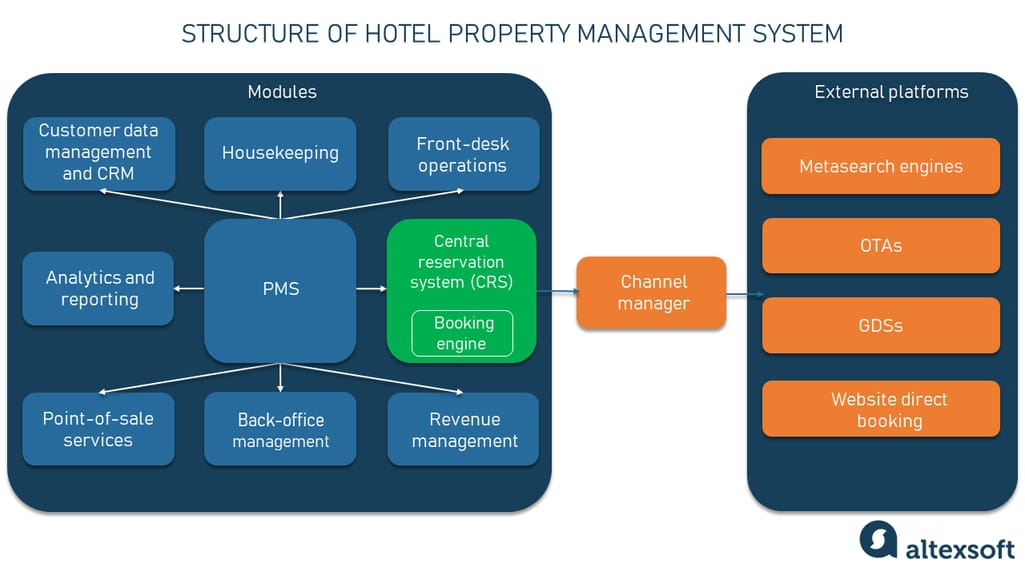
Typical structure of a hotel property management system
Some of the modules can be available as integral parts of the PMS environment, but they often come as stand-alone offerings. To implement upselling and cross-selling strategies, you will need some software pieces listed here. The points of your interest would include a booking engine and front-desk software.
Booking software
The cornerstone of online and offline reservation management, a central reservation system (CRS) tracks all-important booking information, namely the hotel’s availability, rates, and inventory (ARI) data. The CSR commonly integrates with an online booking engine — software that enables secure online reservation processes — through a channel manager. The booking system can be available on your website, social media, and on metasearch engines like Google Hotel Ads.
Communication feature. Booking software comes with functionality for efficient, personalized communication through automated emailing. These can be notifications saying that the booking was confirmed, canceled, or modified or promotional messages. For creating either, there are email templates with customizable layouts to send package deals and additional offers. For example, you can send a pre-arrival confirmation email with a last-minute, extra service such as an airport transfer.
Upselling and cross-selling features. Many booking engines are packed with innovative upselling and cross-selling tools that offer relevant content to customers based on CRM data from their past stays, user actions on a website, metadata from their web sessions, etc. Based on this data, offers are configured automatically. For example, the banner can be displayed on your website during the booking process showing a persuasive message with 20 percent off the price of a more expensive room.
Configuring sections dedicated to package deals. Many booking engines have the functionality to create time-sensitive deals – predefined experiences at an attractive price. Such deals can be scheduled and fine-tuned depending on the season and occupancy needs.
Front-desk software
The front-office module is a centralized, automated software to handle the day-to-day operations of the front-desk staff.
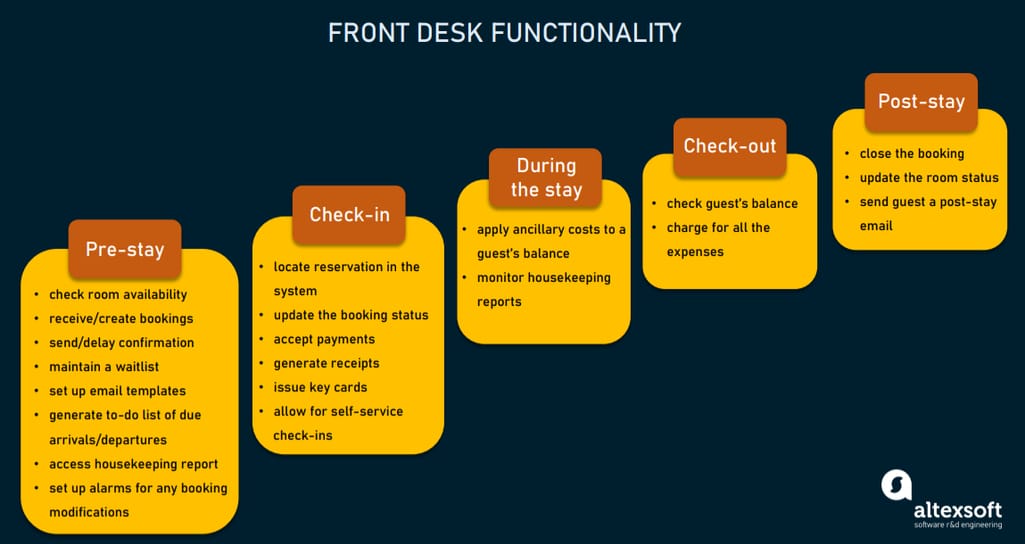
Front-desk software functionality divided into five phases of interaction with a guest
As can be seen from the picture above, front-desk functionality covers the whole guest journey and allows you to manage a lot of property-related tasks, including:
- processing reservations (online and point-of-sales),
- managing guest booking details,
- managing guest check-ins and checkouts,
- tracking hotel inventory and rates,
- handling accounting, and
- managing guest communications (automated emails).
Front-desk software can also be used for upselling and cross-selling. Some software can provide customer segmentation features. With them, you can cluster guests based on needed characteristics (e.g., the type of guest, length of stay, number of booked nights) to provide timely offers at different key points of their stay.
Similar to the booking engine, front-desk software allows your staff to configure offers and set up automated emails.
Data flow and integration logic in managing upsells and cross-sells
Integrations are crucial for different modules to work effectively and provide flawless online upsells and cross-sells within the hotel property management system. In most cases, different technologies communicate with one another using travel APIs and hotel APIs.
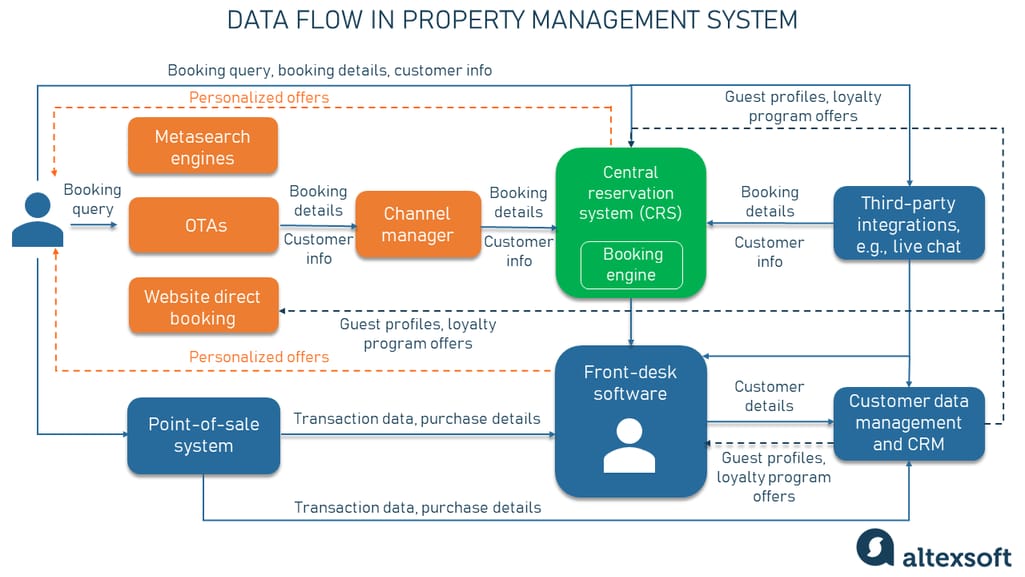
Data flow within hotel property management system
CRM integration. CRMs contain a lot of valuable data about guests including their transaction data, bookings, stay history, email open rates, etc., so integrating your CRM with the rest of the hotel management environment is essential. With it, you can receive complete guest profiles to create more effective, personalized upselling offerings for different segments of customers.
Channel manager integration. For your CRS software to be able to collect valuable reservation info from major distribution systems and website booking engines, there has to be a channel manager. This module enables the distribution of hotel inventory with instant price and availability updates across multiple sales channels.
Point-of-sale system integration. Since the core functions of any PMS are to handle reservations and process payments, POS system integration is necessary. It will give customer transaction data, customer info, and purchase details for building more accurate customer profiles.
Third-party integrations. Your cross-sells depend to a great extent on local activity providers that may have management software systems. Getting your data in sync with your partners can be accomplished by integrating your systems. In addition to that, consider other third-party modules like live chats.
Off-the-shelf upselling and cross-selling software
Automation is a crucial step towards more reliable and high-quality services, resulting in higher customer satisfaction. To achieve automation, there are various software tools packed with all the needed features, including those for cross-selling and upselling.
What to look for in upselling and cross-selling tools
No hospitality business is exactly like the other. It makes sense that different businesses will look for different sets of features in software. We have rounded up those required for quality upselling and cross-selling tools.
Email automation. There should be the opportunity to send offer emails as well as redemption and confirmation emails automatically.
Exclusion lists. Since not all guests may be interested in certain offers, the ability to exclude guests from receiving them is a must-have.
Variety of communication channels. You should be able to reach out to your customers on the right channels throughout the journey including text messages, emails, chatbots, and live chats, to name a few.
Personalization offerings. From customer segmentation to dynamic room upgrade pricing to offer selection, features enabling personalization are an integral part of any upselling and cross-selling software.
Real-time reporting. You need to know who to sell to and what, when, and how to sell. Drawing timely insights through analytics and reporting will help you with that.
Cross-device usage. Your potential guests use various gadgets from desktop computers to tablets to smartphones while looking for a suitable stay. That's why upselling software should work on any device.
Integrations. The system needs to have an automated direct connection with the key systems you operate to keep all your data in sync and receive the latest reservation updates.
Major vendors to consider
Upselling and cross-selling software tools offer a lot of opportunities for hoteliers and property managers. Choosing the right vendor for your hotel depends on a bunch of factors from the characteristics of your property to its size to personal preference to budget and more. Below you will find a few varieties of software that helps upsell and cross-sell.
Please keep in mind that we are not promoting any participants on the list.
Oaky is a commission-free upselling engine that helps hotels automate upselling, personalize it, and maximize profit.
Revenue reporting by Oaky
The platform promises upsell opportunities at every stage of the guest journey from booking to stay. Guests are put in control of upgrading their stay, taking advantage of special deals, or adding any auxiliary services. The solution relies in large part on data for better personalization and has different useful features such as dynamic room upgrade pricing, integrations with various PMSs and CRMs, various guest communication channels, and tailored offerings. There’s an informative revenue reporting feature to help you drive better business insights.
Suitable for: Luxury hotels and boutique inns that are looking for a reliable, high-rated upselling tool.
GuestJoy is a complete guest experience software with features enabling upsell offers, online check-in, announcements, and feedback. The latter results in a great number of online reviews as GuestJoy post-stay guest communication is directly integrated with TripAdvisor.

GuestJoy dashboard
This guest communication and the upselling tool allows you to reach guests at different points of their journey with personalized offers and room upgrades, increasing your revenue. The platform claims its customers have an email open rate of up to 81 percent and a click rate of up to 51 percent.
Suitable for: Various types of properties e.g., hotels, hostels, guest houses, and apartments that need an easy-to-use digital upsell tool.
Duve is another upselling software platform that helps hospitality professionals create more personalized experiences for their guests.
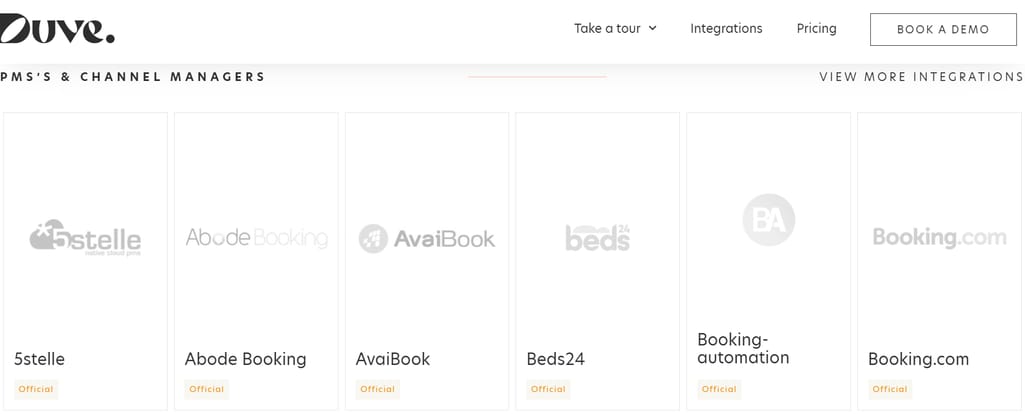
Duve integrations page
Key features include different upsell and cross-sell offers at all points of the guest journey from upsells at booking to pre-arrival emails to on property emails. Not to mention that the platform automates most tasks by allowing online check-ins and checkouts, smart payment processing, and digital keys. There’s a library of customizable deal/offer templates and omnichannel support. Duve has more than 20 integration options including PMSs, channel managers, booking engines, and CRMs.
Suitable for: Vacation rentals, hostels, and other types of alternative accommodation that can take advantage of an effective self-service guest experience solution.
There are a plethora of other digital platforms for upselling and cross-selling that haven’t been included on the list. So, if you are planning to use a ready-made tool, take into consideration that there are a greater number of candidates.
How to digitize hotel upselling and cross-selling
While many hotel owners and managers still rely on traditional upselling and cross-selling approaches, digitalization wins the game hands down. If you want to keep up with the times and digitize your daily operations and tasks, there are two ways to do that.
Pick an off-the-shelf solution
One of the easiest ways to upsell and cross-sell at your property is to choose from available software tools. While a package deal is often the choice, it isn’t always cost-effective as off-the-shelf solutions come with a pack of features you won’t use or need at all. So, pick a tool that has what it takes to meet all the requirements of your business. For example, if you want to upsell throughout the complete cycle of a guest's journey, make sure the software covers all touchpoints.
Opt for a custom-made tool
Those hotel owners and managers who are having trouble finding an upselling tool perfectly suited for their needs may consider custom software development. This doesn't have to be an end-to-end solution built from scratch. Often, hoteliers already use some sort of legacy software that needs to be modernized or extended with new features and/or unique integrations. That’s when available software tools fall short as they offer integrations to popular property management systems, channel managers, and CRMs. At that time, adding a few tailored features to the existing system can be a more reasonable and effective choice.


